Integrated Nursing: Analyzing the Importance of Health Literacy
VerifiedAdded on 2020/03/15
|8
|2119
|48
Report
AI Summary
This report, focusing on integrated nursing, explores the critical importance of health literacy in patient care. It defines health literacy and communication, highlighting the impact of illiteracy on chronic disease management in Australia. The report emphasizes the need for effective communication strategies, including oral and print literacy, as well as numeracy skills. It details intervention strategies such as using plain language, interactive conversations, and clear medication instructions. The author reflects on ideas learned, including the importance of tailored information, patient motivation, and addressing assumptions about patient knowledge. Observations reveal challenges related to understanding medical terms, lack of explanation from doctors, and difficulties faced by patients with low literacy. The report also discusses the benefits of brown bag medication reviews, the Talk-ask-talk communication method, the role of teach-back methods, and the responsibilities of nurse navigators in supporting patients with chronic illnesses. The conclusion stresses the vital role of health literacy in empowering patients and improving health outcomes.
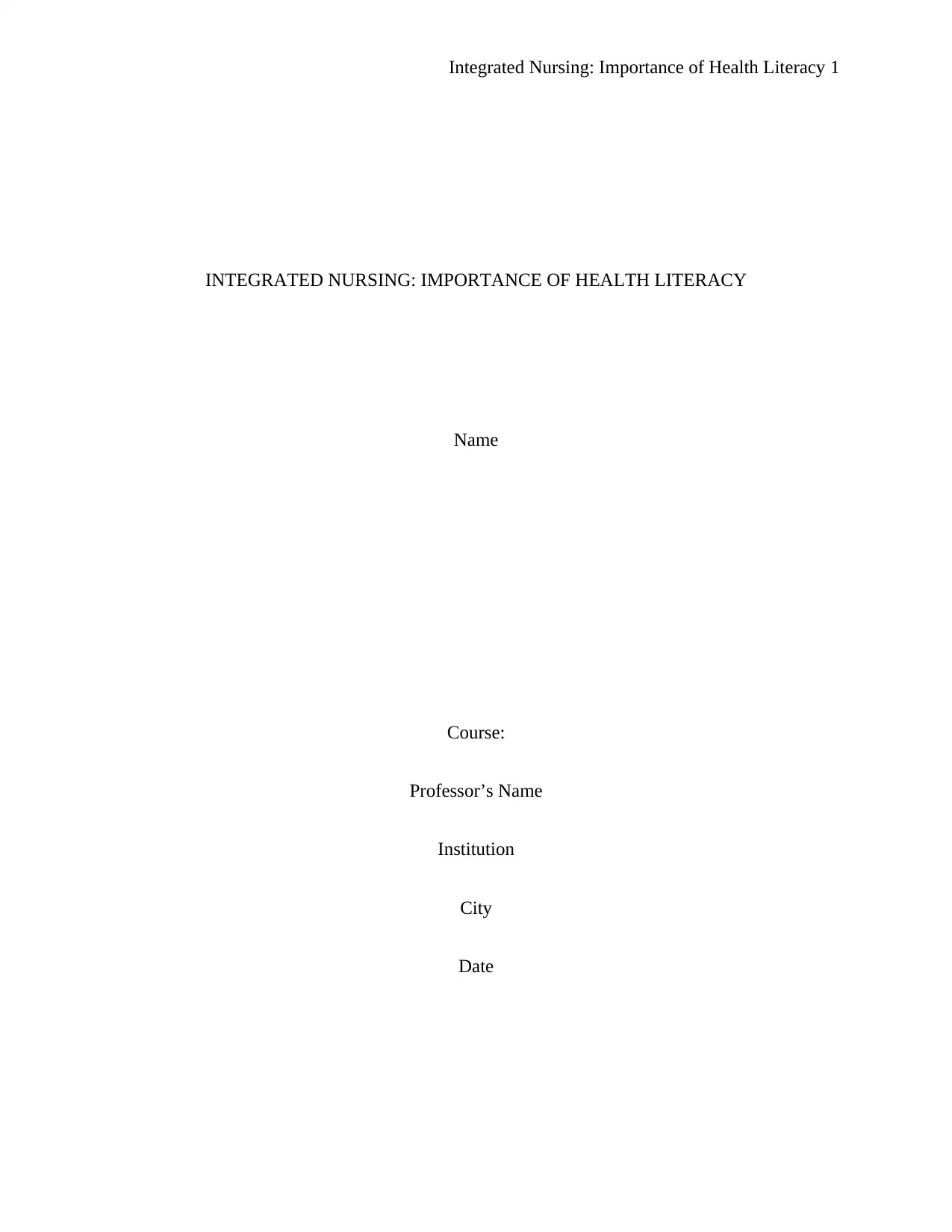
Integrated Nursing: Importance of Health Literacy 1
INTEGRATED NURSING: IMPORTANCE OF HEALTH LITERACY
Name
Course:
Professor’s Name
Institution
City
Date
INTEGRATED NURSING: IMPORTANCE OF HEALTH LITERACY
Name
Course:
Professor’s Name
Institution
City
Date
Paraphrase This Document
Need a fresh take? Get an instant paraphrase of this document with our AI Paraphraser
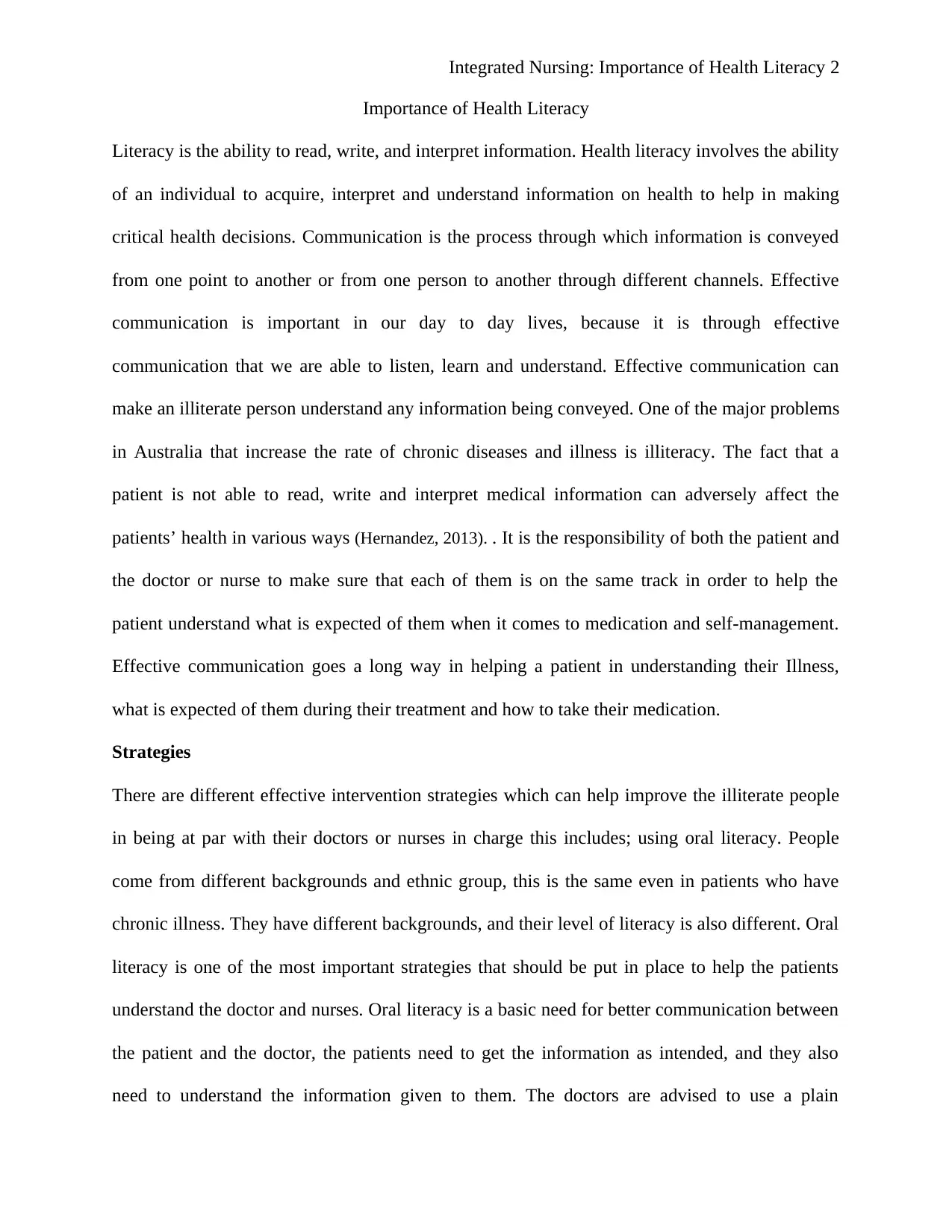
Integrated Nursing: Importance of Health Literacy 2
Importance of Health Literacy
Literacy is the ability to read, write, and interpret information. Health literacy involves the ability
of an individual to acquire, interpret and understand information on health to help in making
critical health decisions. Communication is the process through which information is conveyed
from one point to another or from one person to another through different channels. Effective
communication is important in our day to day lives, because it is through effective
communication that we are able to listen, learn and understand. Effective communication can
make an illiterate person understand any information being conveyed. One of the major problems
in Australia that increase the rate of chronic diseases and illness is illiteracy. The fact that a
patient is not able to read, write and interpret medical information can adversely affect the
patients’ health in various ways (Hernandez, 2013). . It is the responsibility of both the patient and
the doctor or nurse to make sure that each of them is on the same track in order to help the
patient understand what is expected of them when it comes to medication and self-management.
Effective communication goes a long way in helping a patient in understanding their Illness,
what is expected of them during their treatment and how to take their medication.
Strategies
There are different effective intervention strategies which can help improve the illiterate people
in being at par with their doctors or nurses in charge this includes; using oral literacy. People
come from different backgrounds and ethnic group, this is the same even in patients who have
chronic illness. They have different backgrounds, and their level of literacy is also different. Oral
literacy is one of the most important strategies that should be put in place to help the patients
understand the doctor and nurses. Oral literacy is a basic need for better communication between
the patient and the doctor, the patients need to get the information as intended, and they also
need to understand the information given to them. The doctors are advised to use a plain
Importance of Health Literacy
Literacy is the ability to read, write, and interpret information. Health literacy involves the ability
of an individual to acquire, interpret and understand information on health to help in making
critical health decisions. Communication is the process through which information is conveyed
from one point to another or from one person to another through different channels. Effective
communication is important in our day to day lives, because it is through effective
communication that we are able to listen, learn and understand. Effective communication can
make an illiterate person understand any information being conveyed. One of the major problems
in Australia that increase the rate of chronic diseases and illness is illiteracy. The fact that a
patient is not able to read, write and interpret medical information can adversely affect the
patients’ health in various ways (Hernandez, 2013). . It is the responsibility of both the patient and
the doctor or nurse to make sure that each of them is on the same track in order to help the
patient understand what is expected of them when it comes to medication and self-management.
Effective communication goes a long way in helping a patient in understanding their Illness,
what is expected of them during their treatment and how to take their medication.
Strategies
There are different effective intervention strategies which can help improve the illiterate people
in being at par with their doctors or nurses in charge this includes; using oral literacy. People
come from different backgrounds and ethnic group, this is the same even in patients who have
chronic illness. They have different backgrounds, and their level of literacy is also different. Oral
literacy is one of the most important strategies that should be put in place to help the patients
understand the doctor and nurses. Oral literacy is a basic need for better communication between
the patient and the doctor, the patients need to get the information as intended, and they also
need to understand the information given to them. The doctors are advised to use a plain
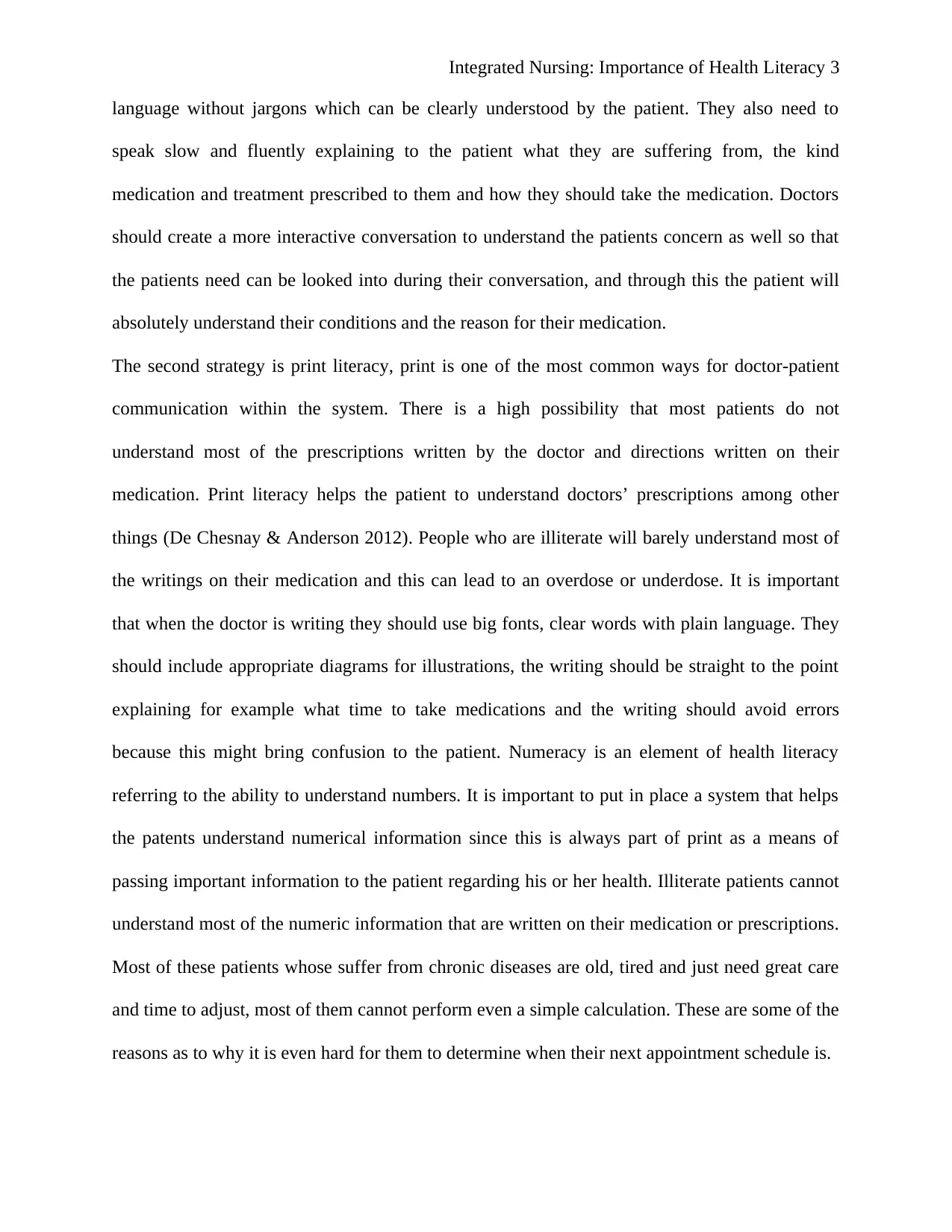
Integrated Nursing: Importance of Health Literacy 3
language without jargons which can be clearly understood by the patient. They also need to
speak slow and fluently explaining to the patient what they are suffering from, the kind
medication and treatment prescribed to them and how they should take the medication. Doctors
should create a more interactive conversation to understand the patients concern as well so that
the patients need can be looked into during their conversation, and through this the patient will
absolutely understand their conditions and the reason for their medication.
The second strategy is print literacy, print is one of the most common ways for doctor-patient
communication within the system. There is a high possibility that most patients do not
understand most of the prescriptions written by the doctor and directions written on their
medication. Print literacy helps the patient to understand doctors’ prescriptions among other
things (De Chesnay & Anderson 2012). People who are illiterate will barely understand most of
the writings on their medication and this can lead to an overdose or underdose. It is important
that when the doctor is writing they should use big fonts, clear words with plain language. They
should include appropriate diagrams for illustrations, the writing should be straight to the point
explaining for example what time to take medications and the writing should avoid errors
because this might bring confusion to the patient. Numeracy is an element of health literacy
referring to the ability to understand numbers. It is important to put in place a system that helps
the patents understand numerical information since this is always part of print as a means of
passing important information to the patient regarding his or her health. Illiterate patients cannot
understand most of the numeric information that are written on their medication or prescriptions.
Most of these patients whose suffer from chronic diseases are old, tired and just need great care
and time to adjust, most of them cannot perform even a simple calculation. These are some of the
reasons as to why it is even hard for them to determine when their next appointment schedule is.
language without jargons which can be clearly understood by the patient. They also need to
speak slow and fluently explaining to the patient what they are suffering from, the kind
medication and treatment prescribed to them and how they should take the medication. Doctors
should create a more interactive conversation to understand the patients concern as well so that
the patients need can be looked into during their conversation, and through this the patient will
absolutely understand their conditions and the reason for their medication.
The second strategy is print literacy, print is one of the most common ways for doctor-patient
communication within the system. There is a high possibility that most patients do not
understand most of the prescriptions written by the doctor and directions written on their
medication. Print literacy helps the patient to understand doctors’ prescriptions among other
things (De Chesnay & Anderson 2012). People who are illiterate will barely understand most of
the writings on their medication and this can lead to an overdose or underdose. It is important
that when the doctor is writing they should use big fonts, clear words with plain language. They
should include appropriate diagrams for illustrations, the writing should be straight to the point
explaining for example what time to take medications and the writing should avoid errors
because this might bring confusion to the patient. Numeracy is an element of health literacy
referring to the ability to understand numbers. It is important to put in place a system that helps
the patents understand numerical information since this is always part of print as a means of
passing important information to the patient regarding his or her health. Illiterate patients cannot
understand most of the numeric information that are written on their medication or prescriptions.
Most of these patients whose suffer from chronic diseases are old, tired and just need great care
and time to adjust, most of them cannot perform even a simple calculation. These are some of the
reasons as to why it is even hard for them to determine when their next appointment schedule is.
⊘ This is a preview!⊘
Do you want full access?
Subscribe today to unlock all pages.

Trusted by 1+ million students worldwide
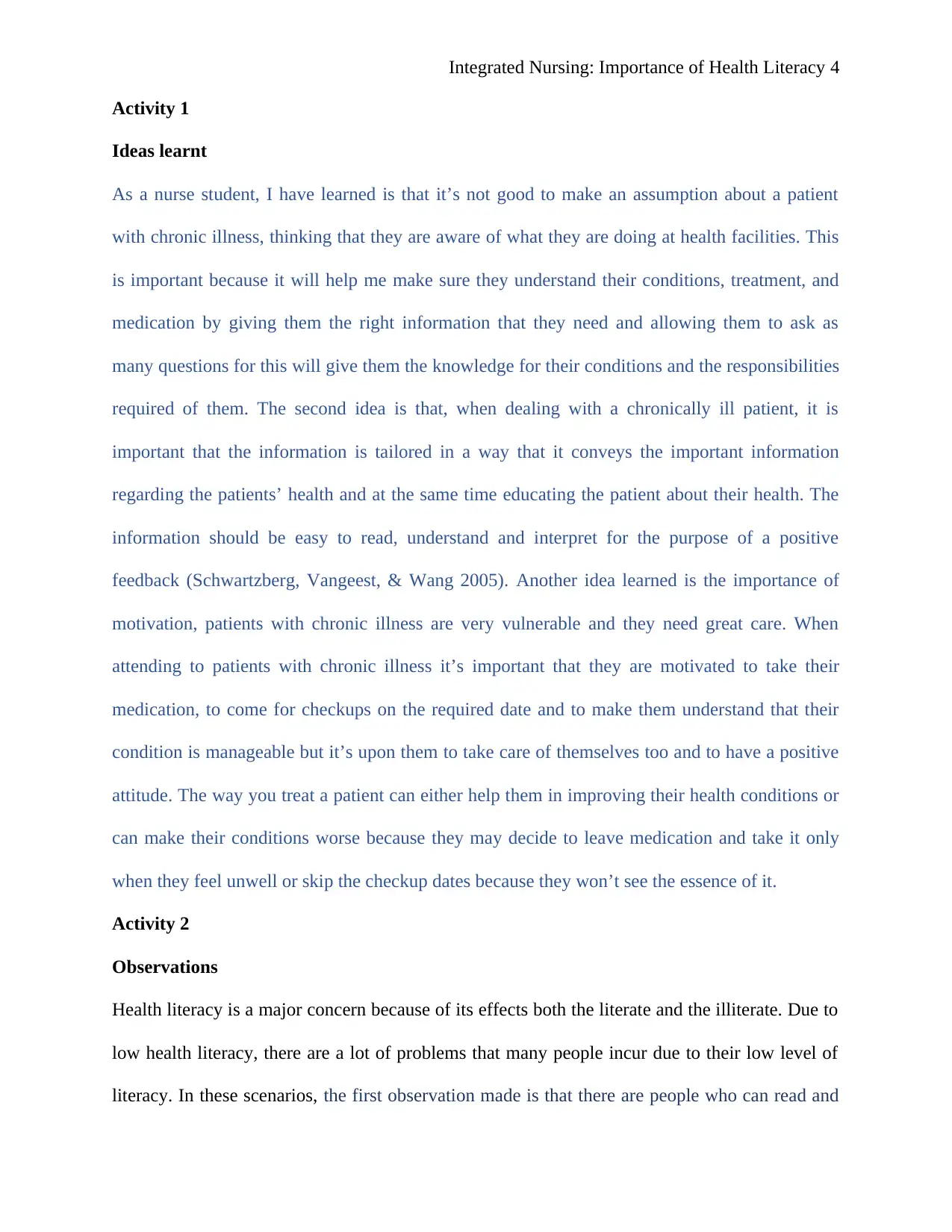
Integrated Nursing: Importance of Health Literacy 4
Activity 1
Ideas learnt
As a nurse student, I have learned is that it’s not good to make an assumption about a patient
with chronic illness, thinking that they are aware of what they are doing at health facilities. This
is important because it will help me make sure they understand their conditions, treatment, and
medication by giving them the right information that they need and allowing them to ask as
many questions for this will give them the knowledge for their conditions and the responsibilities
required of them. The second idea is that, when dealing with a chronically ill patient, it is
important that the information is tailored in a way that it conveys the important information
regarding the patients’ health and at the same time educating the patient about their health. The
information should be easy to read, understand and interpret for the purpose of a positive
feedback (Schwartzberg, Vangeest, & Wang 2005). Another idea learned is the importance of
motivation, patients with chronic illness are very vulnerable and they need great care. When
attending to patients with chronic illness it’s important that they are motivated to take their
medication, to come for checkups on the required date and to make them understand that their
condition is manageable but it’s upon them to take care of themselves too and to have a positive
attitude. The way you treat a patient can either help them in improving their health conditions or
can make their conditions worse because they may decide to leave medication and take it only
when they feel unwell or skip the checkup dates because they won’t see the essence of it.
Activity 2
Observations
Health literacy is a major concern because of its effects both the literate and the illiterate. Due to
low health literacy, there are a lot of problems that many people incur due to their low level of
literacy. In these scenarios, the first observation made is that there are people who can read and
Activity 1
Ideas learnt
As a nurse student, I have learned is that it’s not good to make an assumption about a patient
with chronic illness, thinking that they are aware of what they are doing at health facilities. This
is important because it will help me make sure they understand their conditions, treatment, and
medication by giving them the right information that they need and allowing them to ask as
many questions for this will give them the knowledge for their conditions and the responsibilities
required of them. The second idea is that, when dealing with a chronically ill patient, it is
important that the information is tailored in a way that it conveys the important information
regarding the patients’ health and at the same time educating the patient about their health. The
information should be easy to read, understand and interpret for the purpose of a positive
feedback (Schwartzberg, Vangeest, & Wang 2005). Another idea learned is the importance of
motivation, patients with chronic illness are very vulnerable and they need great care. When
attending to patients with chronic illness it’s important that they are motivated to take their
medication, to come for checkups on the required date and to make them understand that their
condition is manageable but it’s upon them to take care of themselves too and to have a positive
attitude. The way you treat a patient can either help them in improving their health conditions or
can make their conditions worse because they may decide to leave medication and take it only
when they feel unwell or skip the checkup dates because they won’t see the essence of it.
Activity 2
Observations
Health literacy is a major concern because of its effects both the literate and the illiterate. Due to
low health literacy, there are a lot of problems that many people incur due to their low level of
literacy. In these scenarios, the first observation made is that there are people who can read and
Paraphrase This Document
Need a fresh take? Get an instant paraphrase of this document with our AI Paraphraser
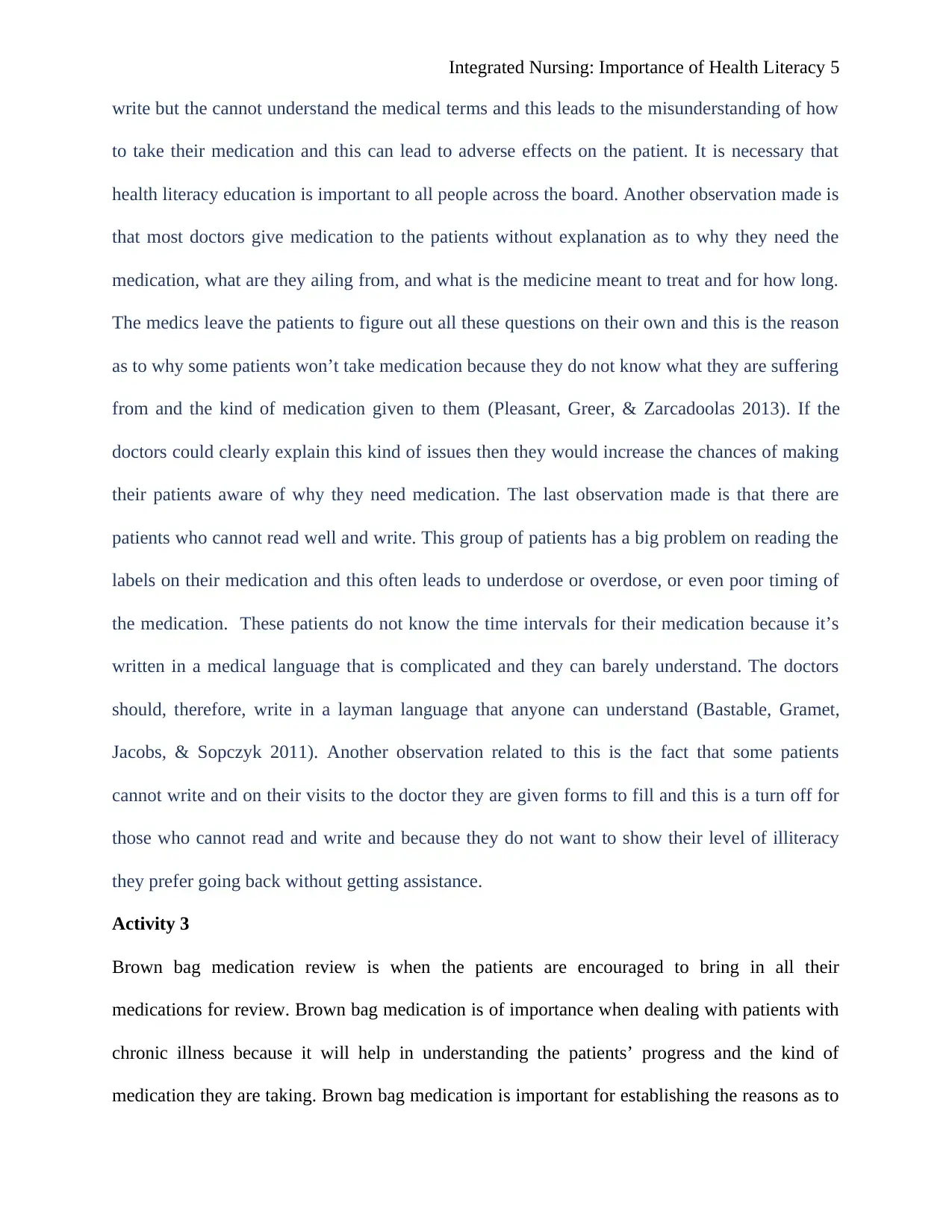
Integrated Nursing: Importance of Health Literacy 5
write but the cannot understand the medical terms and this leads to the misunderstanding of how
to take their medication and this can lead to adverse effects on the patient. It is necessary that
health literacy education is important to all people across the board. Another observation made is
that most doctors give medication to the patients without explanation as to why they need the
medication, what are they ailing from, and what is the medicine meant to treat and for how long.
The medics leave the patients to figure out all these questions on their own and this is the reason
as to why some patients won’t take medication because they do not know what they are suffering
from and the kind of medication given to them (Pleasant, Greer, & Zarcadoolas 2013). If the
doctors could clearly explain this kind of issues then they would increase the chances of making
their patients aware of why they need medication. The last observation made is that there are
patients who cannot read well and write. This group of patients has a big problem on reading the
labels on their medication and this often leads to underdose or overdose, or even poor timing of
the medication. These patients do not know the time intervals for their medication because it’s
written in a medical language that is complicated and they can barely understand. The doctors
should, therefore, write in a layman language that anyone can understand (Bastable, Gramet,
Jacobs, & Sopczyk 2011). Another observation related to this is the fact that some patients
cannot write and on their visits to the doctor they are given forms to fill and this is a turn off for
those who cannot read and write and because they do not want to show their level of illiteracy
they prefer going back without getting assistance.
Activity 3
Brown bag medication review is when the patients are encouraged to bring in all their
medications for review. Brown bag medication is of importance when dealing with patients with
chronic illness because it will help in understanding the patients’ progress and the kind of
medication they are taking. Brown bag medication is important for establishing the reasons as to
write but the cannot understand the medical terms and this leads to the misunderstanding of how
to take their medication and this can lead to adverse effects on the patient. It is necessary that
health literacy education is important to all people across the board. Another observation made is
that most doctors give medication to the patients without explanation as to why they need the
medication, what are they ailing from, and what is the medicine meant to treat and for how long.
The medics leave the patients to figure out all these questions on their own and this is the reason
as to why some patients won’t take medication because they do not know what they are suffering
from and the kind of medication given to them (Pleasant, Greer, & Zarcadoolas 2013). If the
doctors could clearly explain this kind of issues then they would increase the chances of making
their patients aware of why they need medication. The last observation made is that there are
patients who cannot read well and write. This group of patients has a big problem on reading the
labels on their medication and this often leads to underdose or overdose, or even poor timing of
the medication. These patients do not know the time intervals for their medication because it’s
written in a medical language that is complicated and they can barely understand. The doctors
should, therefore, write in a layman language that anyone can understand (Bastable, Gramet,
Jacobs, & Sopczyk 2011). Another observation related to this is the fact that some patients
cannot write and on their visits to the doctor they are given forms to fill and this is a turn off for
those who cannot read and write and because they do not want to show their level of illiteracy
they prefer going back without getting assistance.
Activity 3
Brown bag medication review is when the patients are encouraged to bring in all their
medications for review. Brown bag medication is of importance when dealing with patients with
chronic illness because it will help in understanding the patients’ progress and the kind of
medication they are taking. Brown bag medication is important for establishing the reasons as to
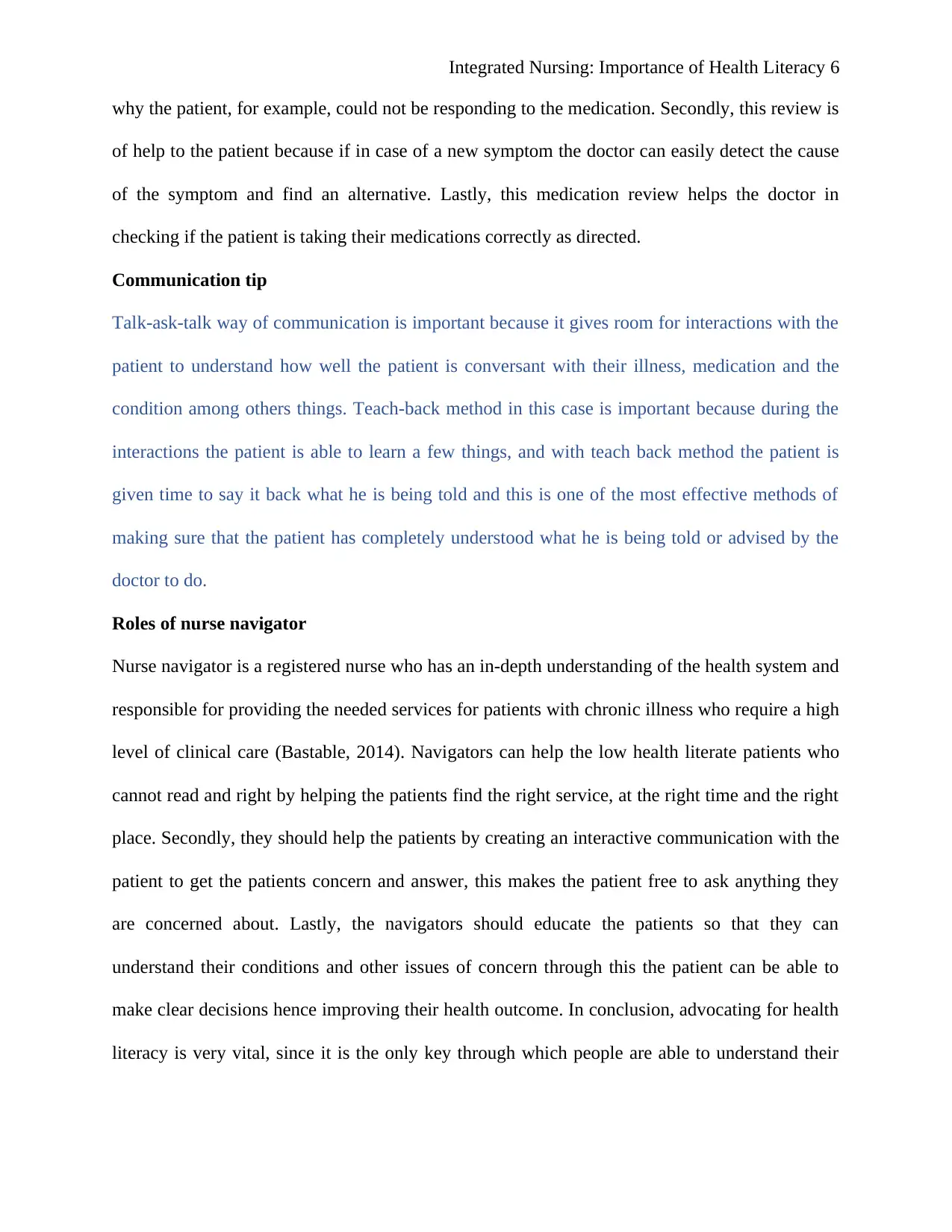
Integrated Nursing: Importance of Health Literacy 6
why the patient, for example, could not be responding to the medication. Secondly, this review is
of help to the patient because if in case of a new symptom the doctor can easily detect the cause
of the symptom and find an alternative. Lastly, this medication review helps the doctor in
checking if the patient is taking their medications correctly as directed.
Communication tip
Talk-ask-talk way of communication is important because it gives room for interactions with the
patient to understand how well the patient is conversant with their illness, medication and the
condition among others things. Teach-back method in this case is important because during the
interactions the patient is able to learn a few things, and with teach back method the patient is
given time to say it back what he is being told and this is one of the most effective methods of
making sure that the patient has completely understood what he is being told or advised by the
doctor to do.
Roles of nurse navigator
Nurse navigator is a registered nurse who has an in-depth understanding of the health system and
responsible for providing the needed services for patients with chronic illness who require a high
level of clinical care (Bastable, 2014). Navigators can help the low health literate patients who
cannot read and right by helping the patients find the right service, at the right time and the right
place. Secondly, they should help the patients by creating an interactive communication with the
patient to get the patients concern and answer, this makes the patient free to ask anything they
are concerned about. Lastly, the navigators should educate the patients so that they can
understand their conditions and other issues of concern through this the patient can be able to
make clear decisions hence improving their health outcome. In conclusion, advocating for health
literacy is very vital, since it is the only key through which people are able to understand their
why the patient, for example, could not be responding to the medication. Secondly, this review is
of help to the patient because if in case of a new symptom the doctor can easily detect the cause
of the symptom and find an alternative. Lastly, this medication review helps the doctor in
checking if the patient is taking their medications correctly as directed.
Communication tip
Talk-ask-talk way of communication is important because it gives room for interactions with the
patient to understand how well the patient is conversant with their illness, medication and the
condition among others things. Teach-back method in this case is important because during the
interactions the patient is able to learn a few things, and with teach back method the patient is
given time to say it back what he is being told and this is one of the most effective methods of
making sure that the patient has completely understood what he is being told or advised by the
doctor to do.
Roles of nurse navigator
Nurse navigator is a registered nurse who has an in-depth understanding of the health system and
responsible for providing the needed services for patients with chronic illness who require a high
level of clinical care (Bastable, 2014). Navigators can help the low health literate patients who
cannot read and right by helping the patients find the right service, at the right time and the right
place. Secondly, they should help the patients by creating an interactive communication with the
patient to get the patients concern and answer, this makes the patient free to ask anything they
are concerned about. Lastly, the navigators should educate the patients so that they can
understand their conditions and other issues of concern through this the patient can be able to
make clear decisions hence improving their health outcome. In conclusion, advocating for health
literacy is very vital, since it is the only key through which people are able to understand their
⊘ This is a preview!⊘
Do you want full access?
Subscribe today to unlock all pages.

Trusted by 1+ million students worldwide
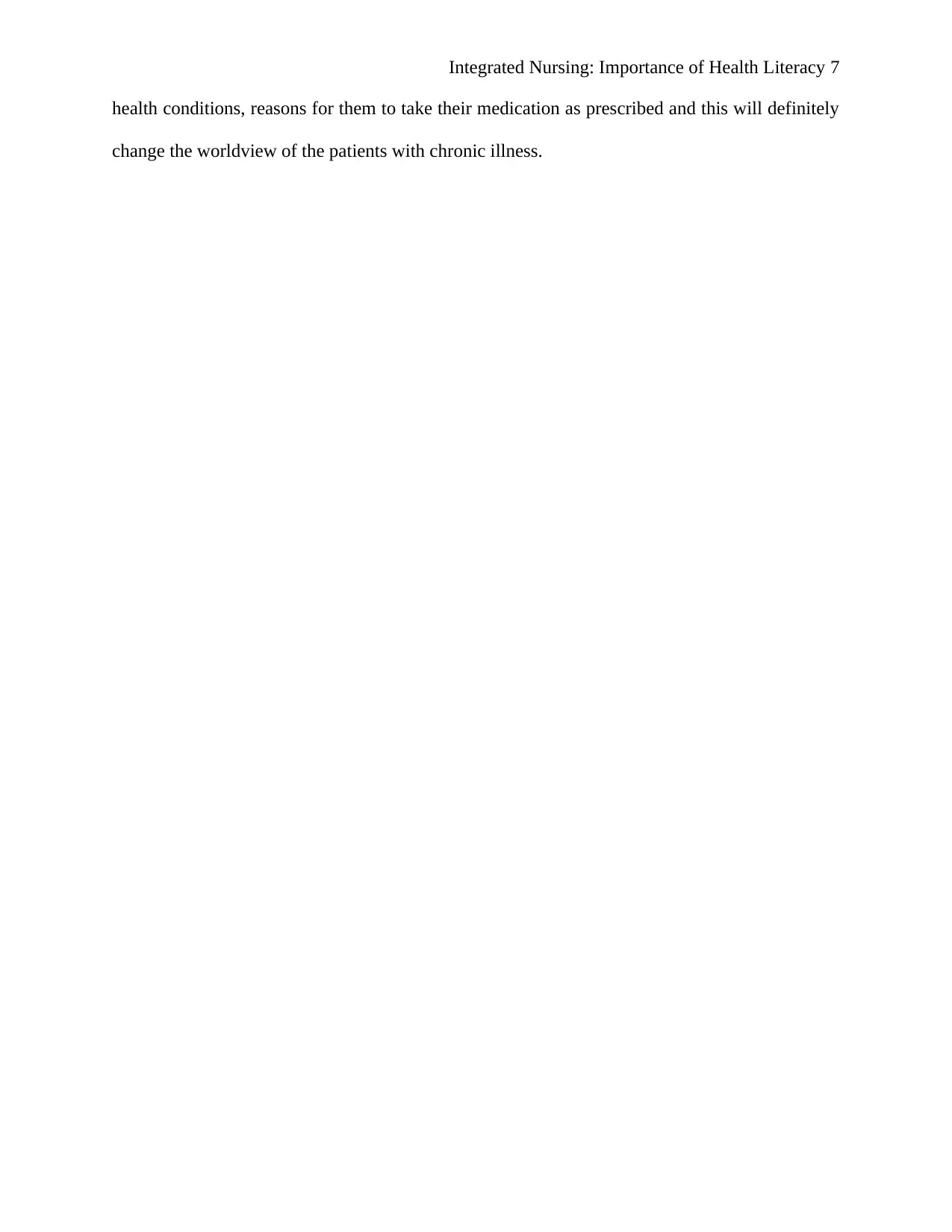
Integrated Nursing: Importance of Health Literacy 7
health conditions, reasons for them to take their medication as prescribed and this will definitely
change the worldview of the patients with chronic illness.
health conditions, reasons for them to take their medication as prescribed and this will definitely
change the worldview of the patients with chronic illness.
Paraphrase This Document
Need a fresh take? Get an instant paraphrase of this document with our AI Paraphraser
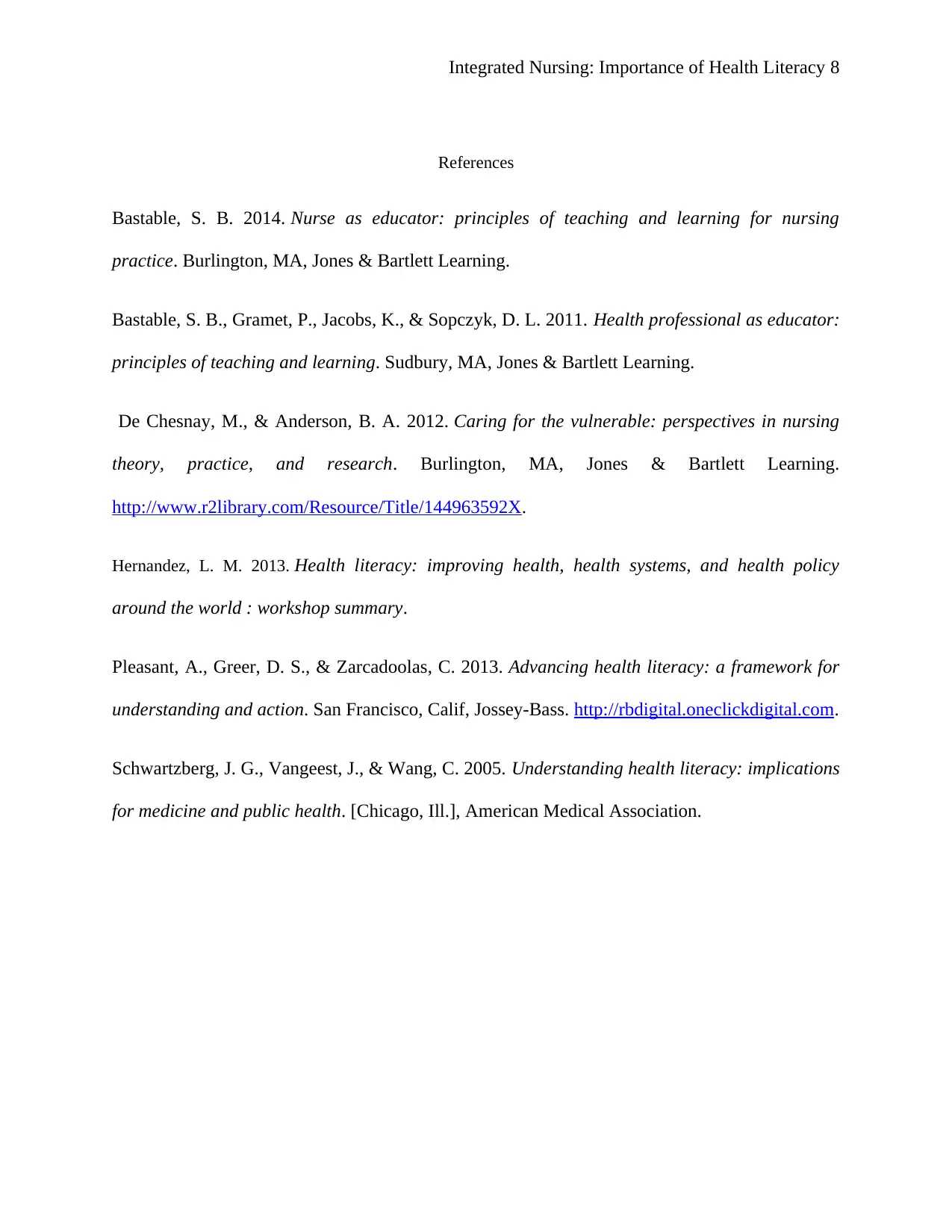
Integrated Nursing: Importance of Health Literacy 8
References
Bastable, S. B. 2014. Nurse as educator: principles of teaching and learning for nursing
practice. Burlington, MA, Jones & Bartlett Learning.
Bastable, S. B., Gramet, P., Jacobs, K., & Sopczyk, D. L. 2011. Health professional as educator:
principles of teaching and learning. Sudbury, MA, Jones & Bartlett Learning.
De Chesnay, M., & Anderson, B. A. 2012. Caring for the vulnerable: perspectives in nursing
theory, practice, and research. Burlington, MA, Jones & Bartlett Learning.
http://www.r2library.com/Resource/Title/144963592X.
Hernandez, L. M. 2013. Health literacy: improving health, health systems, and health policy
around the world : workshop summary.
Pleasant, A., Greer, D. S., & Zarcadoolas, C. 2013. Advancing health literacy: a framework for
understanding and action. San Francisco, Calif, Jossey-Bass. http://rbdigital.oneclickdigital.com.
Schwartzberg, J. G., Vangeest, J., & Wang, C. 2005. Understanding health literacy: implications
for medicine and public health. [Chicago, Ill.], American Medical Association.
References
Bastable, S. B. 2014. Nurse as educator: principles of teaching and learning for nursing
practice. Burlington, MA, Jones & Bartlett Learning.
Bastable, S. B., Gramet, P., Jacobs, K., & Sopczyk, D. L. 2011. Health professional as educator:
principles of teaching and learning. Sudbury, MA, Jones & Bartlett Learning.
De Chesnay, M., & Anderson, B. A. 2012. Caring for the vulnerable: perspectives in nursing
theory, practice, and research. Burlington, MA, Jones & Bartlett Learning.
http://www.r2library.com/Resource/Title/144963592X.
Hernandez, L. M. 2013. Health literacy: improving health, health systems, and health policy
around the world : workshop summary.
Pleasant, A., Greer, D. S., & Zarcadoolas, C. 2013. Advancing health literacy: a framework for
understanding and action. San Francisco, Calif, Jossey-Bass. http://rbdigital.oneclickdigital.com.
Schwartzberg, J. G., Vangeest, J., & Wang, C. 2005. Understanding health literacy: implications
for medicine and public health. [Chicago, Ill.], American Medical Association.
1 out of 8
Related Documents
Your All-in-One AI-Powered Toolkit for Academic Success.
+13062052269
info@desklib.com
Available 24*7 on WhatsApp / Email
![[object Object]](/_next/static/media/star-bottom.7253800d.svg)
Unlock your academic potential
Copyright © 2020–2026 A2Z Services. All Rights Reserved. Developed and managed by ZUCOL.





